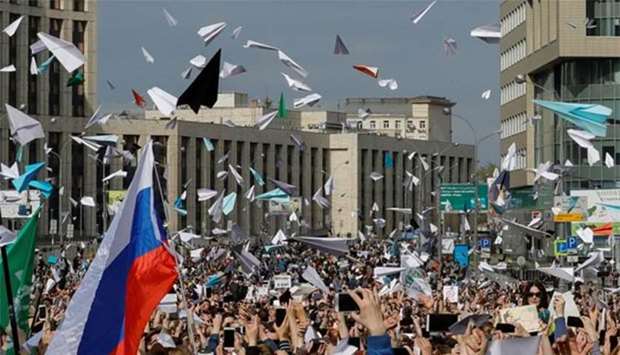Thousands rallied on Monday in Moscow in support of internet freedom after Russian authorities tried to block access to the popular messaging app Telegram in the latest onslaught against dissent under Vladimir Putin.
In an usually strong turnout, at least 8,000 people including top opposition leader Alexei Navalny turned up in the centre of the Russian capital, many holding placards and shooting paper airplanes, the Telegram symbol, an AFP journalist said.A volunteer movement that counts attendees at opposition rallies said more than 10,000 people turned up. Police said 7,500 attended.
"Big moron is not blocking you", read one sign making light of the botched effort by authorities to block the messaging service.
Some in the mostly young crowd chanted "Don't stay silent" and "Putin is a thief."
Earlier this month a court ruled to block Telegram in Russia after it refused to give state security services access to private conversations that are normally encrypted.
But in seeking to deny access to Telegram, the state telecoms regulator blocked millions of IP addresses, disrupting the work of many businesses including car manufacturer Volvo.
Roskomnadzor has failed to fully block Telegram, with Russians turning to VPNs and proxies to bypass the ban.
"Your energy is changing the world," Telegram's maverick founder Pavel Durov wrote on VKontakte, the Russian version of Facebook which he founded, addressing the protesters.
Ahead of the rally he said Russians had a "historic chance" to prevent the onset of full-blown internet censorship in Russia.
"Russia is at a crossroads -- full-scale censorship has not been introduced yet," the 33-year-old said. "Without action Russia will lose Telegram and other popular services."
Under Putin, who was re-elected for a fourth Kremlin term last month, top television channels and most newspapers have been muzzled, with internet remaining the only public venue for free self-expression.
But over the past months the authorities have moved in on the Russian internet, with the telecoms watchdog saying Facebook could also be blocked if it did not comply with local legislation.
Facebook and Telegram are widely used by the opposition to coordinate protests and make political statements.
A 2014 law requiring foreign messaging services, search engines and social networking sites to store the personal data of Russian users inside the country has caused widespread concern.
It is seen as putting the information at risk of being accessed by Russian intelligence services.

